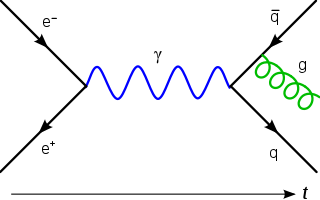In mathematics, the adjective trivial is often used to refer to a claim or a case which can be readily obtained from context, or an object which possesses a simple structure. The noun triviality usually refers to a simple technical aspect of some proof or definition. The origin of the term in mathematical language comes from the medieval trivium curriculum, which distinguishes from the more difficult quadrivium curriculum. The opposite of trivial is nontrivial, which is commonly used to indicate that an example or a solution is not simple, or that a statement or a theorem is not easy to prove.

In physics, lattice gauge theory is the study of gauge theories on a spacetime that has been discretized into a lattice.
In physics, the Landau pole is the momentum scale at which the coupling constant of a quantum field theory becomes infinite. Such a possibility was pointed out by the physicist Lev Landau and his colleagues. The fact that couplings depend on the momentum scale is the central idea behind the renormalization group.
A crystal is a form of solid matter whose constituent atoms, molecules, or ions are arranged in an orderly repeating pattern.
Trivia is information and data that are considered to be of little value. It can be contrasted with general knowledge and common sense. The word is derived from the Latin word triviae, meaning a place where a road split into two. It was introduced into English as the adjective trivial in the 15th and 16th centuries.
Truth is a concept most often used to mean in accord with fact or reality, or fidelity to an original or to a standard or ideal.
In a quantum field theory, one may calculate an effective or running coupling constant that defines the coupling of the theory measured at a given momentum scale. One example of such a coupling constant is the electric charge.
Messiah is a title given to a saviour or liberator of a group of people in Abrahamic religions.
Chaos or CHAOS may refer to:
Howl most often refers to:
Night is the period in which the sun is below the horizon.

In a quantum field theory, charge screening can restrict the value of the observable "renormalized" charge of a classical theory. If the only resulting value of the renormalized charge is zero, the theory is said to be "trivial" or noninteracting. Thus, surprisingly, a classical theory that appears to describe interacting particles can, when realized as a quantum field theory, become a "trivial" theory of noninteracting free particles. This phenomenon is referred to as quantum triviality. Strong evidence supports the idea that a field theory involving only a scalar Higgs boson is trivial in four spacetime dimensions, but the situation for realistic models including other particles in addition to the Higgs boson is not known in general. Nevertheless, because the Higgs boson plays a central role in the Standard Model of particle physics, the question of triviality in Higgs models is of great importance.
Brian Highley is an English writer.
This page is based on this
Wikipedia article Text is available under the
CC BY-SA 4.0 license; additional terms may apply.
Images, videos and audio are available under their respective licenses.
